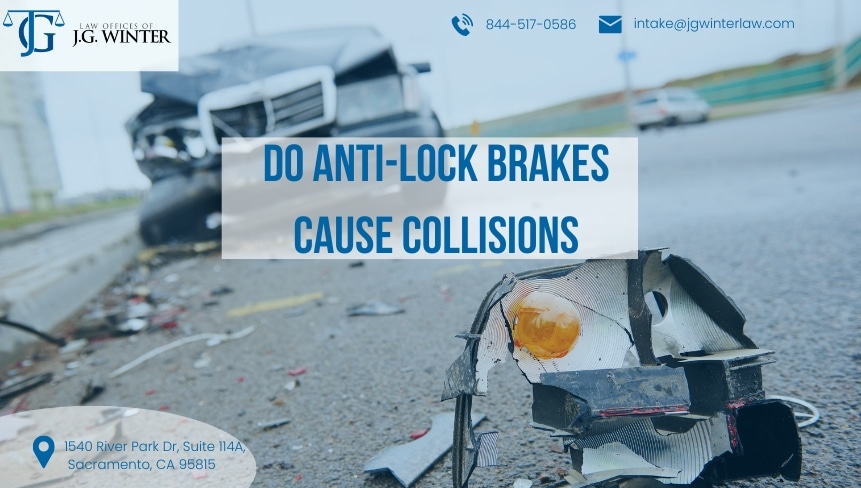Anti-lock Braking Systems (ABS) prevent the wheels of a vehicle from locking up and help drivers maintain control during sudden stops. Despite its role in enhancing safety, there’s an ongoing debate about whether ABS might contribute to collisions under certain conditions. Do anti lock brakes cause collision? Well, some argue that while anti-lock brakes improve vehicle control, they could also lead to overconfidence in drivers, potentially increasing the risk of accidents. J.G. Winter Law understands the complexities surrounding vehicle safety features and provides clarity on ABS to ensure you are well-informed and prepared on the road.
Understanding anti-lock braking systems (ABS)
Anti-lock brakes or Anti-Lock Braking Systems (ABS) prevent a car’s wheels from locking up and skidding during a sudden stop. It maintains your control over the vehicle, allowing for safer braking in emergencies. When you press the brake hard, ABS quickly pumps the brakes, stopping the wheels from locking and helping to avoid skids. The idea of ABS isn’t new; it first appeared in airplanes in the 1950s and made its way into cars in the late 1970s. It has since evolved significantly and become more sophisticated and standard in most vehicles today, reflecting its importance in enhancing road safety.
Consulting with a Sacramento car accident lawyer can provide legal guidance and support in cases involving accidents in which anti-lock brakes may have prevented or exacerbated injuries.
The role of anti-lock brakes in vehicle safety
Anti-lock brakes allow drivers to steer away from obstacles while braking. It improves vehicle control during emergency stops, reducing the risk of accidents. The system is especially effective in slippery conditions, such as wet or icy roads, where the risk of skidding is higher.
- Prevents Wheel Lock-up: Anti-lock brakes prevent the wheels from locking during sudden stops, reducing skidding.
- Improves Steering Control: ABS avoids wheel lock-up. It maintains steering control during an emergency brake, helping to avoid potential crashes.
- Reduces Stopping Distances on Slippery Surfaces: On wet and slippery roads, anti-lock brakes can help reduce stopping distances compared to non-ABS vehicles, though the effect may vary on different surfaces.
- Enhances Driver Confidence: Anti-lock brakes can help maintain control during sudden stops. It makes drivers feel more secure, potentially leading to safer driving behavior.
Common misconceptions about anti lock brakes
While ABS is a significant safety feature, there are several misconceptions about its functionality and impact on driving safety. Understanding what ABS can and cannot do is crucial for proper usage and to maximize its benefits.
- Anti-lock Brakes Reduce Stopping Distances: One common myth is that anti-lock brakes always reduce stopping distances. They are designed to maintain vehicle control, not necessarily shorten stopping distance. On dry roads, stopping distances may be similar with or without ABS.
- ABS Works the Same on All Surfaces: Another misconception is that ABS is equally effective on all surfaces. While anti-lock brakes improve control on slippery surfaces, their effectiveness can vary depending on road conditions.
- Drivers Don’t Need to Steer with ABS: Some believe that ABS takes over steering control during braking. However, anti-lock brakes maintain steering control for the driver, but it’s up to the driver to actively avoid obstacles.
- ABS Eliminates the Need for Safe Driving Practices: There’s a myth that having ABS allows for less cautious driving. Anti-lock rakes enhance safety but do not replace the need for safe driving habits, such as maintaining appropriate speeds and following distances.
ABS and collision rates: What the research says?
Research show that ABS contributes positively to road safety, helping drivers enhance vehicle control in emergency situations. The statistics below underline the value of anti-lock brakes and their role in reducing accidents.
- ABS reduces motorcycle driver fatal crash involvement by 22%.
- ABS decreased motorcycle fatal crash rates by 37% during 2003-08.
- Vehicles with anti-lock brakes generally stop 10 to 15% faster than those without ABS.
How to properly use anti-lock brakes?
Knowing how to use ABS properly is essential to benefit from its safety features fully. Effective use of anti-lock brakes can significantly enhance vehicle control and prevent accidents.
1. Press firmly on the brake pedal
In an emergency, press the brake pedal down firmly and keep it there. ABS prevents the wheels from locking, so you don’t need to pump the brakes. Trust the system to do its job and maintain pressure to allow ABS to control the braking force effectively.
2. Maintain steering control
With ABS, you can steer while braking without losing control. It allows you to steer around obstacles while applying the brakes. You must stay focused and steer in the direction you want the vehicle to go.
3. Understand your ABS system
Familiarize yourself with how the ABS feels when it activates. It helps you recognize that ABS works as intended and prevents panic during emergency braking. Some systems may cause the brake pedal to vibrate or pulsate under your foot.
4. Practice safe driving habits
While ABS is a valuable safety feature, it’s not a substitute for safe driving practices. Keep a safe distance from the vehicle in front of you, and always be aware of your surroundings. Anticipating the need to brake can often prevent situations where emergency braking is necessary.
5. Take a defensive driving course
Consider taking a defensive driving course that includes training on using ABS. Such courses can provide practical experience and knowledge on effectively utilizing ABS and other defensive driving techniques to enhance your safety on the road.
The final verdict: Do anti-lock brakes cause collisions?
So, do anti lock brakes cause collision? The answer is no. ABS helps make driving safer, letting you stop quickly without losing control of your car. It can prevent many accidents, especially on slippery roads. But, just having ABS isn’t enough to avoid all accidents. Safe driving is still very important. You must keep your eyes on the road, drive safely, and keep enough space between cars. ABS is a helpful tool, but it works best when you are also careful.

J.G. Winter Law believes in using every tool we have to stay safe, including ABS. But we also know that being a careful driver is the best way to prevent accidents. If you ever get into an accident, even with ABS, attorney Jeremy Gordon Winter can help you with any legal steps you need to take. Contact us today for a free consultation.
FAQs
Is ABS safe for driving?
ABS is safe for driving and is designed to increase vehicle safety. It helps prevent the wheels from locking up during hard braking, allowing the driver to maintain steering control.
Can ABS cause an accident?
ABS itself does not cause accidents. However, misunderstanding how ABS works or over-relying on it without maintaining safe driving practices could contribute to risky situations.
How do ABS brakes prevent against a collision?
ABS allows you to maintain steer control during an emergency stop and prevent collisions. You can steer around obstacles while braking hard, reducing the chance of a crash.
Does ABS help with skidding?
ABS helps prevent the wheels from locking up during braking and prevents skidding. It allows the tires to maintain traction with the road surface, helping to stop the vehicle safely.
What is the problem with the anti-lock brakes?
The main issue with ABS is not with the system itself but rather the misunderstanding some drivers have about its function and proper use. Some may believe ABS reduces stopping distances under all conditions, which is only sometimes the case, especially on loose or unsteady surfaces.
How do anti-lock brakes keep you safe in a crash?
While ABS improves steering control during braking to prevent crashes, if a crash occurs, maintaining control can help reduce the severity of the collision. Anti-lock brakes allow you to avoid obstacles, potentially lessening the impact.
Should I pump the brakes if my car has ABS?
You should not pump the brakes if your car has ABS. Instead, apply steady pressure to the brake pedal during a stop. It will automatically pump the brakes for you to prevent wheel lock-up.
How can I tell if ABS is working?
You might feel a pulsating sensation in the brake pedal when ABS activates. This is normal and indicates the system is working to prevent the wheels from locking.




